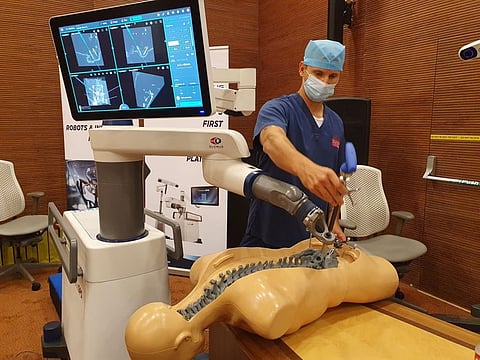New surgical robot to increase precision in spinal procedures at Abu Dhabi hospital
Robot with navigation technology at Burjeel Hospital first of its kind in Middle East

Abu Dhabi: Degenerative spinal conditions are on the rise across the world as a result of the reduced rates of physical activity and increasing obesity. This has increased the need for accurate spinal fusion surgeries. A new surgical robot will soon enhance the precision of such procedures.
The robot, an Excelsius-GPS, from American medical device developer Globus Medical was launched on Monday at Burjeel Medical Hospital, Abu Dhabi.
“Degenerative spine disorders are growing and we see patients in their 30s who need implants to stabilise their spines. This robot will help us improve the precision of the implant placement while also reducing patient discovery and recovery time,” Dr Amr El Shawarbi, consultant neurosurgeon and medical director of neurosciences at the hospital, told Gulf News on the sidelines of a press conference.
Titanium implants
The device is awaiting licensing from health authorities. The doctor said he had more than 40 patients lined up for spinal fusion procedures, which are performed in order to place titanium implants and improve stability for patients. In addition to degenerative conditions, spinal fusion is also performed on patients with conditions such as spondylitis.
Compared to traditional spinal surgery, robotic procedures do not require major incisions.
“Following spinal surgery, patients need to be hospitalised for a week. But with minimally invasive keyhole surgeries, we can mobilise patients the very next day,” Dr El Shawarbi said. He added that increased precision, stemming from the use of GPS technology, is also a big plus, given that 10 to 15 per cent of spinal implants globally are improperly placed, which creates deficits in patients and necessitates repeat surgeries.
In addition, the E-GPS robot also captures images prior to the procedure, which reduces the patient and surgical team’s exposure to radiation from X-rays.
Neurological procedures
Officials said the robot takes about a minute to accurately place the implants, and added that the device can also be utilised for neurological procedures.
“We have performed 75 spinal procedures at Burjeel this year, and about 30 per cent were spinal fusions. We expect this technology to soon revolutionise these procedures for all our patients,” Dr El Shawarbi added.
The E-GPS robot was developed two years ago in the United States and more than 20,000 patients have been treated with it worldwide.
Sign up for the Daily Briefing
Get the latest news and updates straight to your inbox









